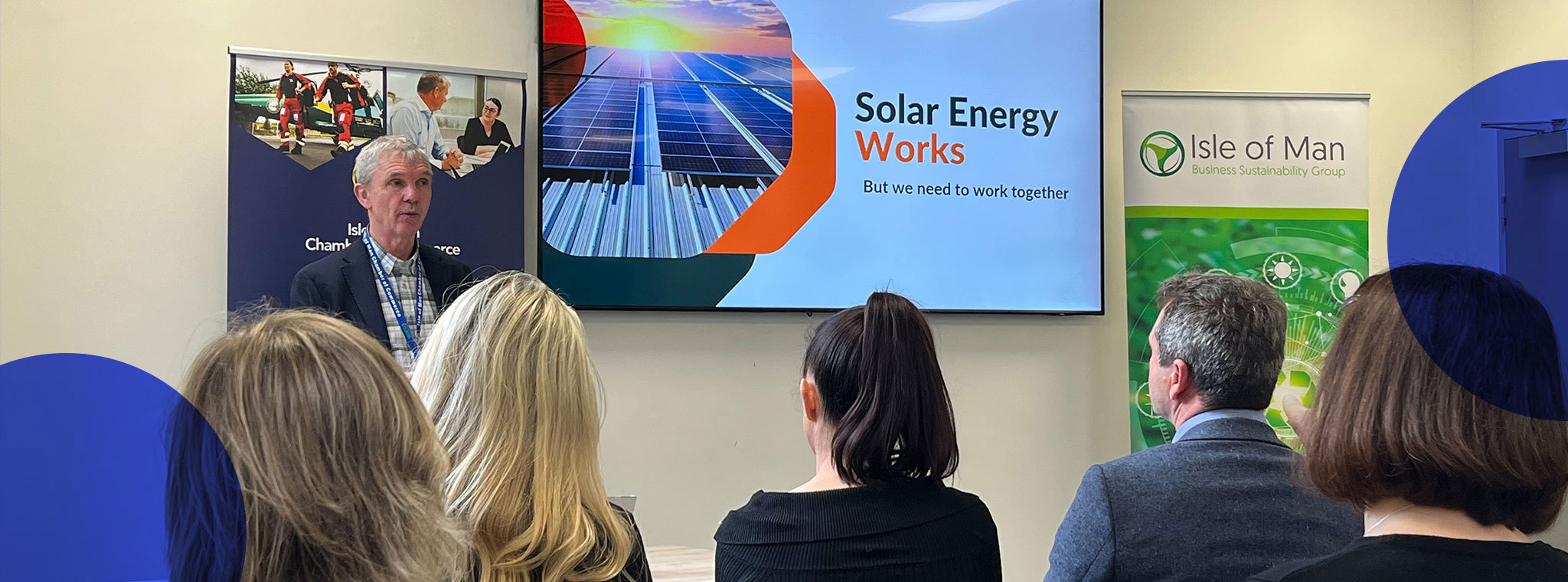IOM Business Sustainability Breakfast: What I learned
I recently had the opportunity to attend the Isle of Man Chamber of Commerce's Business Sustainability Breakfast to learn more about the Island's net zero initiatives.
The aim of the session was to discuss sustainable solutions for the Isle of Man's future and consisted of three presentations from local SMEs:
- Chris Gledhill (CEO, PDMS) shared a case study on solar energy with a domestic and corporate use comparison
- Breeshey Harkin (Climate Change Partner, Transport and Infrastructure) provided an update on sustainable transport projects
- Steve Hull (Climate Change Partner, Finance and Business) shared strategies for private sector investment into nature-based solutions
Each demonstrated the ways in which we can contribute to net zero on the Island and below are the key takeaways and insights I gained from these discussions.
1. Solar energy is a no brainer
Chris Gledhill, a passionate advocate for sustainability, shared his experience of using solar panels both at home since 2019 and at our office over the last 18 months.
Chris shared a detailed overview of the performance of these panels over time using a broad range of datasets available. These cover seasonal and annual variability; differences in solar energy capture depending on the orientation and angle of the panel; and even the carbon lost from the panel that is partly covered by a shadow from his chimney.
Many of us are feeling the pinch from rising energy prices and the statistics provided from Chris' case study shows that solar energy is a viable alternative. Yes, it isn't a cheap investment but the payback period is ten years and the returns speak for themselves. So while the Island is hardly the Costa del Sol, solar energy is still a worthwhile investment.
Chris highlighted that every new house built on the Island should be fitted with solar panels and a battery. It is the cheapest time to install them and there are no downsides but plenty of benefits to be gained from a financial and environmental perspective.
As Chris has found, it's not just homeowners who can get involved. For local businesses, if you have an east-, south- or west-facing roof, you should consider commercial installation. Even if you don't have a roof to use (and not all roofs are suitable), you can put it in the garden or adjacent land to capture the solar energy and feel the benefit.
2. Lots of sustainable transport projects coming down the line
Breeshey shared updates on where we are on the road to reduce the Island's transport-based emissions. Out of road, sea and air, it surprised me to learn that road emissions account for a high proportion, contributing 64% in 2021.
Transport is often viewed as one of the most unavoidable forms of emissions. Sometimes it's not feasible to walk or take the bus on your commute, or avoid taking the plane to get off the Island to see family or have a break. Therefore, it's reassuring to know that there are projects in place to mitigate the emissions and drive sustainable transport on the Island.
Two big reports are coming soon in the form of the Transport Decarbonisation Scenarios Report and the Climate Risks and Opportunities Assessment - both of which will provide recommendations and best practices to meet net zero targets. For the latter, actions will be set out across the next two, five and ten years which is a more tangible approach than aiming for 2030 and 2050. While they are significant dates, they feel very far away whereas action is needed now.
One insight I found interesting was the Fintech Innovation Challenge finalists, Codos Foundation, who are in the beta phase of their 'Codos App'. The app incentivises users to commute sustainably and encourages behavioural change through gamification and suggesting transport. The aim is to reduce commuting emissions which account for 5% of the world's total emissions and is something many of us can relate to. Quite often when making lifestyle changes, it can be hard to know where to start. So by making it an interactive app, it makes sustainable choices more accessible which is always a win.
3. Time to invest in nature
Steve's presentation was a sobering look at why businesses should put their money where their mouth is when it comes to sustainability. He began with some vital statistics about the state of our planet: there has been a 69% decline in nature since 1970 and during that time, 2.5% of animals have gone extinct. This is due to a variety of reasons in addition to climate change, including pollution, overexploitation of animals and habitats, and more.
And it's a lot closer to home than you think. According to the State of Nature Report 2023, the UK is one of the most nature-depleted countries in the world. And the Isle of Man is facing many of the same challenges. While we are a biosphere nation, our biodiversity faces many risks that need our help to overcome. An interesting point Steve made was that conserving and enhancing biodiversity can have a range of benefits, including making us more resilient to the effects of climate change. And isn’t that what we all want?
As highlighted by the presentation, the biggest barrier to positive change is lack of funding. There are plans in place, set up by the Biodiversity Action Plans (BAP) Leaders Group – they just need funding to drive positive action.
The benefits flow both ways – businesses can satisfy ESG and compliance requirements and gain carbon credits to offset unavoidable carbon emissions, while the projects get the funding they need to succeed and protect our natural environment.
4. We're all in this together
A theme that carried throughout the presentations is that greater collaboration and transparency is needed to make progress. There are a wealth of resources out there not just for solar energy but for transport and nature projects so it's easier than ever to get involved.
- For solar energy, more needs to be done to incentivise and explain the processes, criteria and financial and environmental benefits of solar energy.
- For sustainable transport, the Climate Change Transformation team are collating the wealth of information on solutions into one resource pack that is more actionable. They're also sharing blogs on EVs to provide accurate information and avoid disinformation, and publishing reports with actions on a whole host of areas to ensure we're making changes across the board.
- For nature projects, there are many ways businesses can get involved to provide the resources that projects desperately need to save biodiversity and our planet in general.
Sustainability is at the forefront of many people’s agendas though it can be tough to know where to start. Through the Isle of Man Business Sustainability Group and Net Zero Isle of Man, you can find actionable insights to inspire and encourage action both in work and at home, which is what we all need to get the ball rolling and save our planet. So what are we waiting for?
The next Isle of Man Business Sustainability Breakfast is on the 9th May where Manx Utilities will be presenting on the Onshore Windfarm project. Tickets are free and available here.

